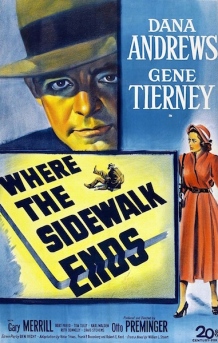Otto Preminger | 91 mins | TV | 12
 Otto Preminger’s film noir — scripted by Ben Hecht, adapted from William L. Stuart’s novel by Robert E. Kent, Frank P. Rosenberg and Victor Trivas, and quite what the difference between “adapting” and “writing” are I’m not sure — offers complex characters in a multi-layered plot. The ending particularly underlines this: the filmmakers could’ve killed anti-hero Dixon, could’ve had him choose to not open the letter, etc; but the decision he takes and the reactions of others are all relatively complex. Earlier, the sequences following Paine’s death are well constructed to produce the maximum amount of tension; their plotting clever, allowing for multiple (albeit similar) interpretations of events. Things happen which seem irrelevant, but are of course none-more-relevant later. Few films today are so brave as to not explain such things immediately.
Otto Preminger’s film noir — scripted by Ben Hecht, adapted from William L. Stuart’s novel by Robert E. Kent, Frank P. Rosenberg and Victor Trivas, and quite what the difference between “adapting” and “writing” are I’m not sure — offers complex characters in a multi-layered plot. The ending particularly underlines this: the filmmakers could’ve killed anti-hero Dixon, could’ve had him choose to not open the letter, etc; but the decision he takes and the reactions of others are all relatively complex. Earlier, the sequences following Paine’s death are well constructed to produce the maximum amount of tension; their plotting clever, allowing for multiple (albeit similar) interpretations of events. Things happen which seem irrelevant, but are of course none-more-relevant later. Few films today are so brave as to not explain such things immediately.
There are lots of great scenes like these — look at the single scene featuring Klein and his wife, for example. It doesn’t have to be there — Klein could’ve just given his partner the cash — but for the sake of one short scene we get two proper characters. Yes, they’re quickly and sketchily drawn, but believable with it. The same goes for the old woman listening to the radio — does it matter that her husband’s dead, that she sits there for company, which she only gets because Paine always waves to her? Not particularly — but that it is there really adds to the film. Even the crooks get similar treatment, tiny elements (such as one character’s parole) progressing and returning, almost insignificant subplots that all have a place and function in the greater story.
Dana Andrews is an effective lead, believable as Dixon the thuggish cop. We support him, but only just — he doesn’t quite have the instant likeability of Bogie’s Marlowe, for example, but he’s enough on the side of right that we can get behind him. Gary Merrill’s Scalise is an appropriate villain. He’s not in it much — a little at the beginning, a little at the end — but he permeates the film to a degree, the uncatchable boss just out of reach, who Dixon wants to pin everything on.
All the other performances are good too, but perhaps most memorable is Karl Malden as newly-promoted Lt. Thomas. He’s both good at his job and bungling — for example, he creates a completely plausible theory of how Jiggs did the crime, convincing all around him; but the viewer knows how incorrect and circumstantial it all is, which makes Thomas look slightly bumbling even when he’s apparently on to a winner. Malden doesn’t make him too silly or bungling — he could be like Nigel Bruce’s Watson, for example — but nor does it go too far the other way, making him so hardline that he becomes a villainous figure. It’s a fine line that Malden negotiates with skill.
I really enjoyed Where the Sidewalk Ends, perhaps more than I expected to, and I should say it narrowly missed out on my 2009 Top Ten.

